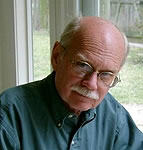

This collection of books and manuscripts would not exist if I had not gone to Nigeria in 1962 as a Peace Corps volunteer. Prior to my departure, I had earned both a B.A. and an M.A. in American literature and written my thesis on William Faulkner’s Snopes trilogy. I fully intended to return to the United States and pursue a Ph.D. in American literature. Fortunately, the summer before my departure for Nigeria, I read Chinua Achebe’s Things Fall Apart and Amos Tutuola’s The Palm-Wine Drinkard.
Nigeria totally altered my worldview, mostly by showing me the failure of my earlier education. Not only did I begin reading emerging works by African writers, but I realized that in the many American literature courses that I had taken, I had never read a work by a minority writer. I began ordering books from the United States and reading Richard Wright, Ralph Ellison, James Baldwin, and other African American writers. How ironic that the man who directed my M.A. thesis and taught the American literature survey course I took never mentioned a single African American writer, yet he was an African American. After I returned to the United States, I discovered that he had one of the most extensive private collections of African American literature, but he obviously never felt comfortable enough to assign any of those writers in his own courses.
How fortunate that the school where I taught English in Eastern Nigeria was a scant few miles from Ogidi, the village where Achebe grew up and the setting of his celebrated novel. I was aware of Ogidi’s proximity to my own village and was even told that Achebe visited his family there from time to time, but I made no attempt to meet him until several years later. Equally important, however, was Onitsha, the Igbo center of business and culture, a dozen miles from where I lived. It was there that I purchased many of the original titles by the Onitsha pamphleteers and had my first true sense of what was already becoming a major school of African writing. In Onitsha at the CMS Bookstore, I also purchased Achebe’s third novel, Arrow of God, soon after it was published.
Nigeria changed my scholarly life. When I returned home I was determined to see that works by African writers were reprinted in American editions, and in the spring of the 1965 academic year, I taught my first course in African literature. The rest is history.